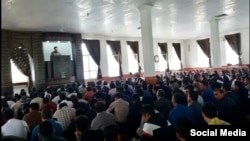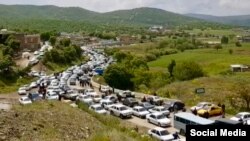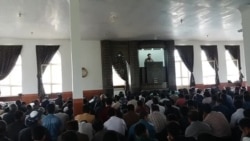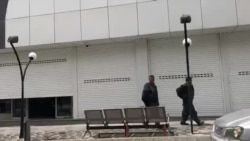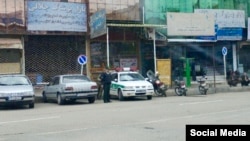Thousands of Iranian Kurds from a northwestern border city made a defiant gesture against the government Friday by attending prayers with a cleric who supports their 20-day-old protest movement.
The residents of Baneh in Iran’s Kurdistan province drove by car to a mosque several kilometers from the city to join the prayers led by local cleric Mohammad Adibi.
People who attended the service and shared images of it with VOA Persian said Adibi encouraged the worshippers to continue peacefully participating in a general strike that has paralyzed Baneh’s economy since April 15.
WATCH: Iranian Kurds Pray with Imam Who Supports Their Strike
Residents began the strike to protest Tehran’s blockade of border footpaths that they rely on to import goods from Iraqi Kurdistan for sale in Baneh’s thousands of stores. Adibi told the worshippers that he agreed with their demands for the government to re-open the footpaths used by porters, or kolbars, to carry Iraqi goods. He said the months-long blockade has hurt Baneh’s people.
Local activists said the higher-than-usual attendance at Adibi’s prayer service represented a boycott of Baneh’s Iranian government-appointed Friday imam, or prayer-leader, Jamal Karimi. It was not clear how many people attended prayers at his mosque on Friday.
WATCH: Day 20 of General Strike in Baneh, Iran
Residents said Baneh’s internet remained cut off for a third day and special police maintained a strong street presence Friday to try to deter people from continuing the strike. But they said Iranian Revolutionary Guard Corps troops who appeared Wednesday left the next day and did not return.
Iranian Kurds also reacted on social media to an endorsement of the Baneh protest movement from a prominent Iranian figure — exiled crown prince Reza Pahlavi.
The U.S.-based son of Iran’s last ruling shah made the endorsement via Twitter on Thursday, saying: “The strike by the people of Baneh is a bright example of solidarity and courage that all of us should learn from.”
He said resistance and civil disobedience is the key to toppling the “cult of racketeers,” his term for Iran’s Islamist leadership that ousted his father in a 1979 revolution. Pahlavi ended his tweet by writing: “In tomorrow’s free Iran, with one another’s help, the beautiful land of Kurdistan will become one of the main hubs of tourism and commerce.”
An Instagram post of Reza Pahlavi’s tweet by VOA Persian drew more than 5,000 likes and 1,000 comments.
Some comments were negative, with users saying they do not like Reza Pahlavi because his father, Mohammed Reza Pahlavi, authorized the execution of Iranian Kurdish separatist leader Qazi Muhammad in 1947. But most Instagram users who posted comments welcomed the support of Reza Pahlavi for the Baneh strike.
Sanctions
Since December, Iran has seen frequent public protests against local and national authorities and business owners accused of mismanagement, corruption and suppressing freedoms. Iranian leaders have deflected corruption accusations and other complaints by accusing foreign powers of instigating the protests, without providing evidence.
In an interview with VOA Persian at a Washington forum hosted by the Heritage Foundation on Thursday, the research group’s Middle East senior fellow James Phillips said the current wave of unrest does not match the scale of 2009’s mass anti-government protests in Tehran, but does incorporate many more cities. He said that if the U.S. follows through with threats to re-impose nuclear-related sanctions on Iran, there could be “even more economic grievances” for Tehran to deal with.
Speaking to VOA Persian at the same event, American Foreign Policy Council senior vice president Ilan Berman said the protests need a coherent set of demands and leaders in order to progress.
“Otherwise, they will continue to be examples of opposition to the regime, but not examples of a way forward,” he said.
Other analysts at the forum told VOA Persian that they support congressional efforts to pass the Iranian Leadership Asset Transparency Act, a bill that would require the U.S. Treasury Secretary to publish reports about the estimated financial assets of senior Iranian leaders suspected of corruption. The bill passed the House in December and has been taken up by a Senate committee.
Ayatollah's wealth
American Enterprise Institute Scholar Michael Rubin said Iran’s people deserve to know the scale of the wealth accumulated by Supreme Leader Ayatollah Ali Khamenei and his associates.
“That money should be redistributed to the people that earned it, rather than simply being accumulated by people who use the façade of religion to mask their own corruption,” Rubin said.
Foundation for Defense of Democracies senior adviser Richard Goldberg said the U.S. should not only disclose the wealth of Iranian leaders, but also seize their assets. He said Washington should send this message to Iran’s ruling clerics: “You are not using your assets to better your people, you are using them to better yourselves and pouring them into countries that have nothing to do with Iran, like Syria and Yemen.” Iran has intervened in civil wars in both nations by supporting Syria’s President Bashar al-Assad and Yemen’s Houthi rebels.
Michael Lipin and Farhad Pouladi of VOA’s Persian Service contributed from Washington.




